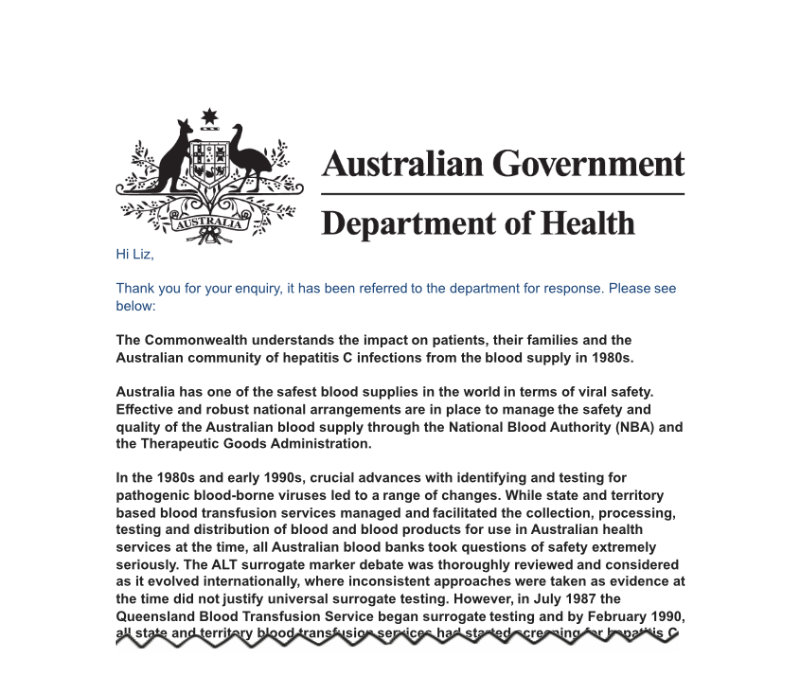The UK Health Secretary has just admitted his government’s “moral responsibility” for the UK’s contaminated blood scandal of the 1970s and 1980s. Meanwhile, the Liberal/National government still refuses to apologise and offer financial support to the up to 20,000 victims as recommended 17 years ago by a Senate Committee. And Labor, which has similarly ignored the recommendations, has just acknowledged the “historic injustice” but says it can’t do anything. Why is it so hard for the victims asks Elizabeth Minter? Is it because CSL, the darling of Australia’s business community, lies at the heart of the scandal?
“The Government is just waiting for us all to die.”
Greg Ball no doubt speaks for most of the survivors of one of Australia’s greatest public health scandals. As a result of the negligence of the then government-owned Commonwealth Serum Laboratories and the state Red Cross blood services, between 8,000 and 20,000 Australians were left with the then deadly Hepatitis C and/or HIV/AIDS after being transfused with contaminated blood.
Mr Ball had a successful house painting business but when he started experiencing constant nausea, severe fatigue and night sweats, he had to stop working. He had developed cancer after being treated with Hepatitis C-contaminated blood products. Mr Ball had to sell the family home and now survives on the disability support pension.
For 17 years Coalition and Labor governments have refused to implement key recommendations from a 2004 Senate inquiry into the infected blood scandal that would have been life-changing for the victims.
Senate recommendations ignored
The report of the 2004 Senate Committee inquiry Hepatitis C and the blood supply in Australia made a number of recommendations, including an apology to the victims; that they be provided with appropriate medical, counselling and welfare services; and that all out of pocket expenses be covered, including costs of visits and transport to GPs, prescribed medication, health services including physiotherapy and dental care; and home care and/or home help.
Victims say the lack of financial support to cover out-of-pocket expenses has been devastating. From their limited income victims have been forced to pay for the costs of fighting illnesses they contracted, often as a result of negligence.
As Susanne Walters notes, “it’s an expensive business keeping yourself alive”, even more so for Australians living in rural/regional areas.
In a last resort to treat the Hepatitis C she contracted after an operation in the 1990s, Ms Walters was given compassionate access to a drug trial lasting 26 weeks.
While the drug was free, her transport costs alone to access the treatment, which was only available in a capital city, cost her more than $15,000.
The weekly round trip airfares ($300 plus); the taxi fares to and from the hospital and the airport ($100); the overnight stays in Melbourne ($150 plus); and other doctors’ fees not covered by Medicare ($250 each trip) quickly added up. All costs that should have been covered under the Senate recommendations.
Under the recommendations, out-of-pocket expenses for prescribed medication should also have been covered.
While the Coalition government pats itself on the back for spending $1 billion to put a number of drugs on the Pharmaceutical Benefits Scheme, this simply means that victims aren’t paying top dollar for the drugs that keep them alive.
Which is just as well, because most of them, like Greg Ball, are living on the poverty line as a result of being given contaminated blood. And still he continues to cover his out-of-pocket medical costs and for transport to and from his medical appointments.
Even the provision of home care, as the Senate inquiry recommended, would have made an enormous difference, a point illustrated movingly by Barbara in her Senate submission.
“I could not cope with day-to-day tasks and chores; I was always feeling unwell and was labelled a lazy, unfit wife and mother by my former husband and his family.
The fatigue would get so extreme that I would fall asleep while feeding or changing my baby. I would fall asleep so easily that I had inadvertently put my baby’s wellbeing at risk on a number of occasions.”
‘Settlement’ schemes
The Government also points to the support given by the Commonwealth “through its contributions to state and territory hepatitis C settlement schemes”.
Note the word “settlement”. They are not compensation schemes. If victims take (financially prohibitive) legal action, and win, then the Commonwealth will contribute to the settlement.
In its final report, the 2004 Senate Committee blandly accepted that compensation schemes did exist.
“Compensation schemes exist in the States and Territories for those people who have acquired hepatitis C through the blood supply.”
However, the Committee went on to state that: “The Committee was unable to ascertain the exact details of each scheme.”
If a Senate committee, with all its powers of evidence gathering, cannot find out the details of a scheme, how does a member of the public find out? Do they exist?
Moreover, as noted in a previous article, the Committee was completely opposed to a compensation scheme for people who had contracted Hepatitis C through blood and blood products.
At the time minimal compensation was available to people who had acquired HIV/Aids as a result of negligence.
The Senate committee, chaired by Labor’s Senator Jan McLucas, decided that extending that compensation scheme to people who had acquired Hepatitis C through blood and blood products was “not in [the victims] best interests”.
The committee found evidence of a time-limited scheme in the ACT, the only state/territory to admit liability for not putting in place a key test that helped identify contaminated blood.
Black Mark on Red Cross: decision to ignore 5c test for contaminated blood proved fatal
Silence is deafening
Last month, when appearing before the UK Infected Blood Inquiry, Matt Hancock, the UK Health Secretary, agreed the government had a “moral responsibility” to address the contaminated blood scandal.
He said he also wanted to make sure the victims’ voices were heard.
“I acknowledge the pain and the suffering not only of the initial … errors that led to this harm on people’s lives, but also a sense that redress wasn’t properly considered and that people felt their voices weren’t heard, and I want to make sure those voices are heard.”
In the UK, on average one person is dying every four days from contaminated blood.
Just weeks ago, in an interesting admission, Labor wrote in an email that Australia’s victims had suffered an “historic injustice” but says it can’t do anything.
“Labor and Mark (Butler, shadow health minister) understand the very real and urgent frustration of victims and their supporters … But the Opposition Leader cannot do anything to address this historic injustice,” wrote the staffer to a victim.
On the contrary, a few things spring to mind:
- publicly acknowledge in Parliament the trauma this forgotten group of people has experienced;
- put pressure on the government to implement the 2004 recommendations; and
- push for a judicial inquiry.
The silence is deafening for victims, with no political party interested in their plight.
Is it because CSL, the darling of the business community and one of Australia’s first $100 billion company, lies at the heart of the scandal? Is it because the Red Cross blood services, which rely on the goodwill of hundreds of thousands of Australians giving up their time (and blood), don’t want the whole story to come out?
In Cold Blood: how privatisation of CSL abandoned the victims of Australia’s public health tragedy
Other countries make amends
Compare Australia’s abandonment of the people our public health authorities infected with fatal illnesses to the way other countries have made amends to their citizens.
The United Kingdom
The UK’s Infected Blood Inquiry began in 2017 and hearings are still under way. Financial payments began in 1988 but differed between Scotland and England. They have recently been brought into line. Lump sum payments of £50,000 are paid to Hepatitis C survivors, means tested monthly payments are available to help with general living costs; and up to £900 a year is available to pay for counselling. Bereaved partners receive a £10,000 lump sum and annual payments. Earlier this year, the UK government finally accepted liability for “the worst treatment disaster in the history of the National Health Service” with compensation now also on the table.
Ireland
Ireland’s package includes a compensation tribunal where claims are heard individually; and a Health Care Package that covers GP visits; all prescribed medication, all health treatment including physio and dental services; counselling costs; massage treatment; and home help (house work) services.
Canada
Canada’s royal commission into the scandal ran from 1993 to 1997. Compensation was put in place, including a lump sum of $120,000 and $30,000 a year (indexed in 2010) for life. Bereaved spouses received $20,000 a year for five years, while children received $4,000 a year for five years. All out of pocket expenses were covered. Where appropriate, income replacement schemes also operated.
Michael West Media put a number of questions to the Greg Hunt and the Health Department. In its 647-word response it failed to answer most of the questions. Some of the key questions were:
- How many Australians have died after being infected with Hepatitis C and HIV/Aids because of infected blood and blood products provided by the Commonwealth Serum Laboratories and the Red Cross blood services? No answer.
- It is 17 years since the 2004 Senate inquiry into the infected blood scandal. When will the recommendations of that inquiry be implemented? No answer.
- A government apology was recommended by the 2004 Senate inquiry – Where and when was that apology given? No answer.
- What counselling was provided to victims following that 2004 inquiry? No answer.
- When will the Australian government implement financial assistance similar to that which has been available in the UK since 2003? No answer.
- Unlike Canada and the UK, Australia has never had a legal investigation into the use of infected blood. When will Australian be announcing a royal commission similar to Canada’s and the UK’s? No answer.
The full response from the Department of Health is available here.
A 30-year veteran of the mainstream media, Liz was the editor of MWMuntil June 2021. Liz began her career in journalism in 1990 and worked at The Age newspaper for two 10-year stints. She also worked at The Guardian newspaper in London for more than seven years. A former professional tennis player who represented Australia in the 1984 Los Angeles Olympics, Liz has a Bachelor of Arts and a Bachelor of Letters (Hons).


